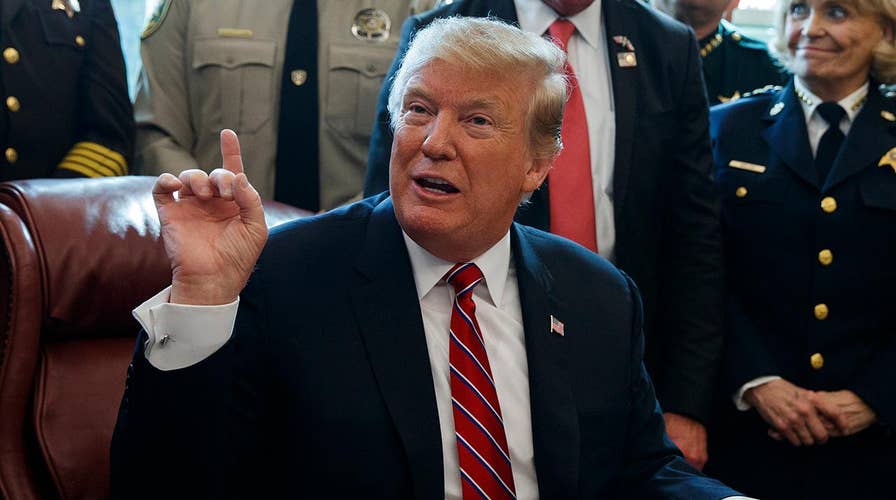President Trump stands firm on national emergency declaration; Pelosi announces vote to override veto
Trump issues first veto of his presidency over border security; reaction and analysis on 'The Five.'
We all know our border policy is broken. The question is, how do we work together to fix it? As the only member of the House Homeland Security Committee who represents a southern border district, I have some ideas.
The border is my home. I am a Democratic member of the U.S. House of Representatives representing people living along nearly 180 miles of the border in New Mexico that ranges from economic trade zones to some of the most remote stretches of the U.S.-Mexico border.
I have visited and walked along the border in each of these areas, and I can tell you firsthand that a one-size-fits-all approach to border security simply won’t work. We need strong, smart and fair solutions.
TRUMP WIELDS FIRST PRESIDENTIAL VETO TO NIX BORDER EMERGENCY REBUFF
We need a border policy that stops drug traffickers, human smugglers and dangerous criminals.
I have seen areas where physical barriers work. Barriers work when they’re strategically placed based on smart and careful analysis – but a wall from sea to shining sea is fiscally irresponsible.
While serious challenges exist, calling the complex issues along our border a national emergency and claiming that a physical barrier is the only solution is misguided.
Ask any Border Patrol agent and he or she will tell you that physical barriers don’t stop crossings – they just delay them. That matters in urban, high-traffic areas where it takes seconds to minutes to cross and get away. However, in the most remote areas where it can take hours to days to cross the desert, a tall physical barrier just doesn’t make sense.
In our most remote areas, like the ones I represent, we need smart investments in technology and personnel.
There are still Border Patrol stations and checkpoints operating on Internet speeds equivalent to the days of dial-up, exponentially increasing the time it takes to perform basic tasks and diverting already stretched resources. New technology can also alert agents to threats earlier and enable them respond to changing events faster.
At the same time, Customs and Border Protection struggles to both retain good agents and hire new ones, causing severe understaffing in our most rural and remote regions. This makes it more dangerous for our agents as well as those crossing.
This is why I have introduced two pieces of bipartisan legislation with my colleague Rep. Will Hurd, R-Texas, that seek to address these issues.
The first bill restructures and streamlines an outdated overtime system to ensure Border Patrol agents are able to receive specialized training, that those who are also serving in the National Guard aren’t penalized for performing their duties. It also allows for those commuting to remote stations the flexibility to work longer hours during a shorter week so they can spend more time with their families.
The second bill would direct Customs and Border Protection to develop a strategy to improve hiring and retention in rural or remote areas that also takes into consideration direct feedback from personnel and families stationed in these locations.
Another fundamental part of border security is a clear and moral immigration system. A wall doesn’t stop people legally and voluntarily presenting at the border to claim asylum. Instead, we need a more predictable, efficient asylum process.
We also need better work visas so people who love our country and want to work hard and follow our laws can legally contribute to our economy. And we need a path to citizenship for Dreamers who have grown up in this great country and call it home.
That is why I was proud to cosponsor H.R. 6, the Dream and Promise Act. This legislation is the first step towards a clear and moral immigration system that keeps our border communities vibrant and safe.
While serious challenges exist, calling the complex issues along our border a national emergency and claiming that a physical barrier is the only solution is misguided. It sets a dangerous precedent and undermines the work needed to get the job done along the border.
CLICK HERE TO GET THE FOX NEWS APP
Unfortunately, instead of respecting Congress’ bipartisan rejection, President Trump vetoed the measure Friday that would have ended the national emergency declaration.
I am committed to addressing our nation’s border security needs with strong, smart, and fair solutions and will work together with my colleagues on both sides of the aisle. Now is the time to learn from those who live and work on the border, rather than relying on divisive talking points.

